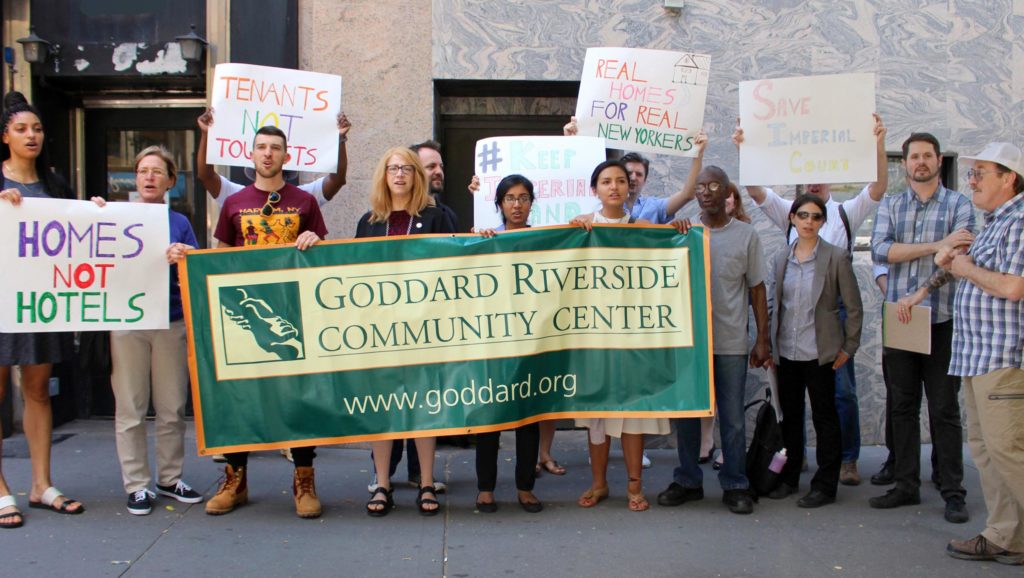
What if you woke up one morning to discover your building had become a hotel? Strangers arriving late at night, talking and smoking in the halls. Sex workers renting rooms for business. Out-of-towners throwing loud parties.
It happened to Richard Amelius.
“We started seeing maid carts and they were fully occupying the elevator all day long,” he recalls. “Some days I would come out and there were bags of laundry in front of my door, which I would have to move.”
The tourist rental business “grew and grew,” he says, “to the point where it was a full-fledged hotel. People were checking in and out nightly.”
Amelius has lived at the Imperial Court, a Single Room Occupancy (SRO) building on West 79th Street, for the last 16 years. SROs offer private rooms with a shared bathroom in the hall and a communal kitchen. In the mid-1900s some 200,000 SROs provided cheap living spaces for large numbers of New Yorkers; but they fell out of favor with urban planners, and now only a few dozen survive.
The Imperial Court is supposed to provide desperately needed long-term affordable housing. But in recent years there’s been more money in short-term guests, so that’s what the landlord pursued. These illegal rentals weren’t exactly a secret. The Imperial Court is still listed on the popular travel site Tripadvisor. Its page boasts of its “grand marbled lobby,” room service, and laundry room. It has over 500 reviews. A city inspection once found 99 out of the building’s 227 units simultaneously rented out to short-term guests.
Amelius and other tenants joined forces with the Law Project to sue the landlord. Then the Mayor’s Office of Special Enforcement joined the suit. In 2016, the plaintiffs secured a temporary restraining order barring the Imperial Court from renting out rooms for less than a month at a time. And earlier this month, they settled the case. The landlord, Michael Edelstein, paid nearly $300,000 in fines and fees and agreed never to use the property for short-term rentals again. That may not seem very significant now, but it could be when New York emerges from the COVID-19 pandemic.
“It’s huge because we’re getting back all these units that were being used for tourist rentals. The goal is to return them to rent stabilization,” said Dan Evans, the Law Project attorney on the case.
“Five tenants took down a major landlord. They shut down a million dollar business.”
Any celebrations by the tenants were cut short, however.
“Literally the day after that judgement was won they began construction on the building. They were removing bricks from the front and it was very noisy,” says Amelius. “Then they moved from the facade to the west side where I live, and there were men right outside my window with a jackhammer.”
He called the office of Assemblywoman Linda B. Rosenthal, who has fought alongside the tenants for years—“Linda has been a champion of ours,” says Amelius. The Department of Buildings came and issued a stop work order. Amelius says the work started again, was stopped a second time, and has started again.
“We’re an annoyance,” he says. “They’re going to keep pushing because they’ve been successful at getting away with it, or been slapped with a nominal fee.”
Amelius says the tenants would consider a buyout, but don’t want to be harassed out of their rooms without compensation. Sometimes he dreams of leaving. Other times he imagines what it would be like to have the building full of permanent tenants again. After all, he says, there’s no lack of demand: “I could fill this building with people I know who want to live close to work and don’t make 200- or 300 thousand dollars a year.”
Amelius isn’t sure what will happen next. But despite the ups and downs of the case, he has nothing but praise for the Law Project. “They’re heroes for us,” he says. “Everyone there is equally nice and intelligent and capable. They could go to work for a major law firm and make tons of money, but they dedicate their lives to helping people instead. I can’t thank them enough.”